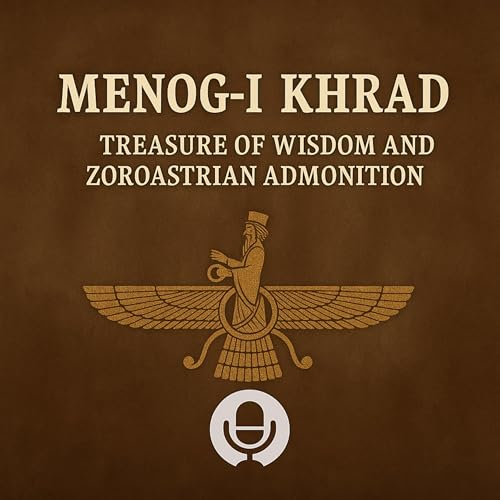
2- The Spirit of Wisdom
Failed to add items
Add to basket failed.
Add to Wish List failed.
Remove from Wish List failed.
Follow podcast failed
Unfollow podcast failed
-
Narrated by:
-
By:
About this listen
The Mēnōg ī Xrad (“Spirit of Wisdom”) is a Middle Persian text from the Sasanian era that embodies the centrality of xrad (wisdom) in Zoroastrian religion and Iranian philosophy. This ethical and philosophical treatise functions both as a pand-nāmag (book of counsel) and as a spiritual discourse. It highlights the Zoroastrian worldview in which wisdom is regarded as divine, practical, and essential for the balance between the material (gētīg) and spiritual (mēnōg) realms. Beyond its religious value, Mēnōg ī Xrad shaped the tradition of Persian moral literature and deeply influenced Ferdowsi’s Shahnameh.1. The Role of Wisdom in Zoroastrian ReligionIn Zoroastrian cosmology, wisdom is a spiritual essence, inseparable from divine knowledge. Ahura Mazda (Ohrmazd) is said to have created and sustained the universe through wisdom. The text describes wisdom as the foundation of human duty (xwēškārī), right thinking (hu-mata), and righteous action (aṣ̌a). Wisdom is portrayed as the supreme faculty that enables humanity to understand the cosmic struggle between truth (asha) and the Lie (druj).2. Ethical Literature and Didactic TraditionComposing books of counsel (andarz-nāmag) was considered a religious duty among Zoroastrians. Works like Mēnōg ī Xrad and Drakht-i Asurik (The Assyrian Tree) laid the groundwork for Persian ethical treatises. Later, they inspired moral passages in Ferdowsi’s Shahnameh and the broader Iranian wisdom tradition. This genre contributed significantly to Persian ethical philosophy, religious instruction, and literary aesthetics.3. The Search for WisdomIn the narrative framework, a sage seeks wisdom across religions and sects but discovers contradictions. Ultimately, he recognizes the truth in Zoroastrian teachings. When asked what is best for body and soul, Mēnōg ī Xrad answers: wisdom itself, since both the material world (gētīg) and spiritual world (mēnōg) are governed by its power.4. Practical Ethical TeachingsThe text emphasizes universal virtues and moral discipline:Respect for elders and loyalty to rightful leaders.Rejection of idolatry, falsehood, greed, wrath, sorrow, lust, and envy.Detachment from wealth, power, lineage, and fleeting life.Advocacy of diligence, moderation, lawful livelihood, and purity of relations.#ZoroastrianWisdomhttps://studio.youtube.com/playlist/P...#MenogIKhrad#AncientIranianEthics#ZoroastrianTextsJustice toward enemies, loyalty to friends, gratitude, and devotion to the yazatas (divine beings).5. Superiority of Wisdom and Moral VirtuesWisdom is depicted as humanity’s most reliable guide. The text highlights virtues such as generosity (rādī), truthfulness, perseverance, gratitude, self-knowledge, gentleness, duty, and contentment. Essential acts include giving charity, maintaining truth, observing festivals (gāhānbār), performing rituals, worshiping divine beings, and wishing well for all creation.6. Death, Judgment, and the AfterlifeAfter death, the soul remains near the body for three nights before crossing the Činvat Bridge. Judgment is conducted by Rashn the Just, weighing deeds with cosmic balance. The righteous ascend to the luminous paradise (vahisht), guided by the embodiment of their good deeds. The wicked are dragged to hell (duzh-xvāst), accompanied by demons and their evil actions. Heaven is depicted as three levels of eternal joy; hell as a place of severe torment.7. Blessed and Cursed LandsThe most blessed places are the house of the righteous, the fire-temple, cultivated lands, sites of worship, and centers of creation and prosperity. The most cursed lands include hell, sites of bloodshed, idolatrous temples, the houses of infidels, and desolate wastelands.DisclaimerThis document has been prepared with the assistance of artificial intelligence (AI).


